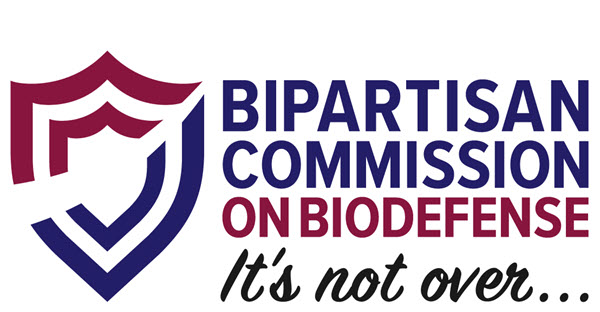On Pandemic Anniversary, Commission Finds U.S. Remains at Catastrophic Biological Risk

FOR IMMEDIATE RELEASE
Contact: Steve Aaron, SRA Communications, (717) 554-8614, steve@SRACommunications.com
ON PANDEMIC ANNIVERSARY, COMMISSION FINDS U.S. REMAINS
AT CATASTROPHIC BIOLOGICAL RISK
Commission Releases New Recommendations to Defend Against Biological Threats
WASHINGTON, D.C. (March 30, 2021) – A new analysis from the Bipartisan Commission on Biodefense finds that the United States remains at catastrophic biological risk. The Commission is urging the Administration and Congress to take more actions now to avoid another pandemic or biological attack. Called Biodefense in Crisis: Immediate Action Needed to Address National Vulnerabilities, the report closely examines the extent of progress that has been made since the Commission released its seminal National Blueprint for Biodefense in 2015. Despite warnings from public health professionals and the Commission, the country was caught unprepared for the COVID-19 pandemic. The Nation remains dangerously vulnerable to biological threats, despite some gains in preparedness and response.
“The COVID-19 pandemic was predictable,” said Commission Co-Chair, former Senator Joe Lieberman. “That is what our Commission learned from the experts we have consulted since we began operations in 2014. This global crisis resulted from a foreseeable combination of mutations, lack of immunity, poor preparedness, limited surveillance, and failure to learn from past pandemics. When our Commission released its National Blueprint for Biodefense in 2015, we concluded that our recommendations could and should be implemented by the Executive and Legislative Branches within five years. However, out of our 87 recommended action items, the government has completed just 3, took some action to address 56, no action on 22, and emergency or crisis actions on 6 in response to the COVID-19 pandemic. We are still more vulnerable to the next pandemic than we should be.”
Biodefense in Crisis provides a fresh assessment of governmental efforts to implement the Commission’s recommendations to prevent, deter, prepare for, detect, respond to, attribute, recover from, and mitigate biological threats. It also includes eleven updated recommendations based in-part on real-time learning during the pandemic.
“While the current spotlight on COVID-19 is necessary and urgent, it would be a costly mistake to focus solely on this pandemic to the exclusion of all other biological threats,” said Commission Co-Chair, former Secretary of Homeland Security Tom Ridge. “Nation-states such as China, Iran, North Korea, and Russia continue to invest heavily in advancing biotechnology and could produce biological agents and weapons. Terrorist organizations also remain interested in learning how to attack enemies with biological agents. National biodefense must begin and end with strong national leadership. The efforts of all federal departments and agencies with responsibilities for biodefense need to be coordinated, and they must be held accountable, by the White House.”
Among the eleven new recommendations in the report, the Commission advises the President to establish a dedicated Deputy National Security Advisor for Biodefense, overseen by the Vice President and supported by NSC staff. The Commission clearly notes that one federal department cannot tell other departments and agencies what to do, especially in a critical area of responsibility like biodefense. A dedicated higher-level leader in the White House without responsibilities for multiple weapons of mass destruction, terrorist avenues, and national disasters is crucial.
The Commission also continues to recommend eliminating the ineffective BioWatch program. Current BioWatch technology performs poorly and is far from the deterrence mechanism it was originally intended to be. It uses limited, decades-old collection equipment that only provides data hours or days after a biological event. Congressional appropriators should deny further funding to BioWatch activities until proven replacement technology is identified and confirmed to meet the needs of the Biodetection 2021 acquisition program.
The full Biodefense in Crisis: Immediate Action Needed to Address National Vulnerabilities report can be downloaded by clicking here.
About the Bipartisan Commission on Biodefense
The Bipartisan Commission on Biodefense was established in 2014 to conduct a comprehensive assessment of the state of U.S. biodefense efforts, and to issue recommendations to foster change. The Commission’s 2015 report, A National Blueprint for Biodefense: Leadership and Major Reform Needed to Optimize Efforts, identified capability gaps and recommended changes to U.S. policy and law to strengthen national biodefense while optimizing resource investments. Subsequent Commission publications have addressed critical needs for agrodefense, biodefense budgeting, diagnostics, science and technology, and State, Local, Tribal and Territorial capabilities. In September 2018, the White House released the National Biodefense Strategy, a top recommendation from the Blueprint. The Commission continues to address biodefense challenges and to urge reform. Former Senator Joe Lieberman and former Governor Tom Ridge co-chair the Commission. Hudson Institute is the Commission’s fiscal sponsor.

